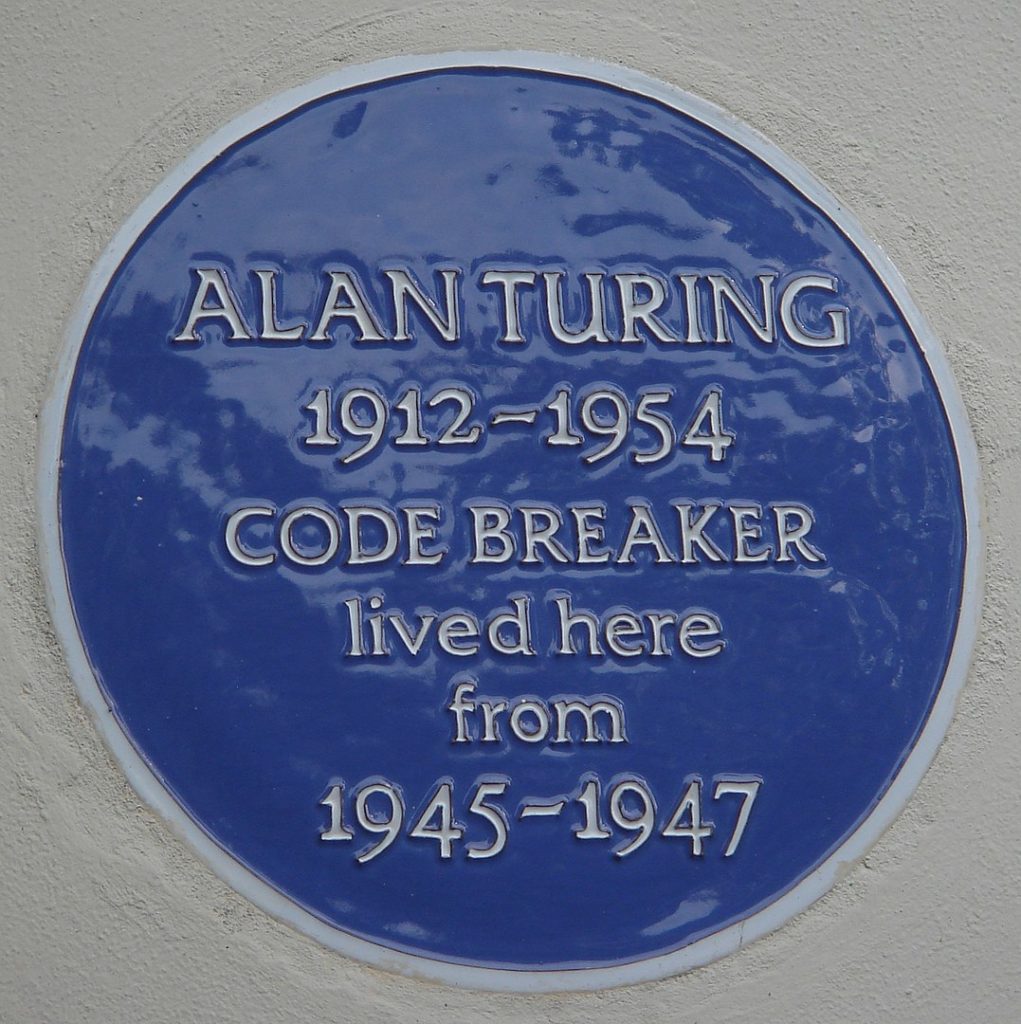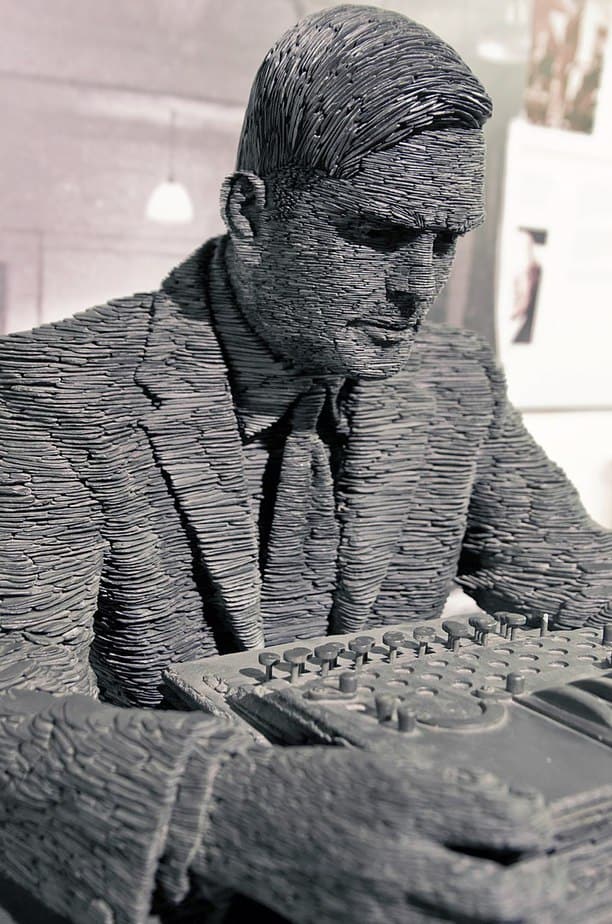
Photo sourced from Wikimedia
Top 15 Facts about Alan Turing
*Originally published by Lillian on August 2021 and Updated by Vanessa in October 2022
Alan Turing was a British polymath credited as being the father of computer science and artificial intelligence. Turing worked for the British intelligence team during World War II.
He was able to break the Enigma Code and ended the war. This code, engineered by the Germans, was not easy to break in.
Turing greatly contributed to the development of computer science. He helped formulate concepts of algorithms and developed the Turing machine.
His great and impressive work got him featured in several novels, music albums and movies. An Oscar Award-nominated film was produced by Benedict Cumberbatch telling his life story.
As one of the most innovative scholars of the 20th century, Turing’s approach to problem-solving was genius. There is a lot more about Alan Turing.
Read more about him in the top 15 facts below.
1. Alan Turing showed his talents from a very young age

Photo by Edwardx – Wikimedia
Turing loved numbers from a very young age. His headmistress was among the first adults to notice his talents. He was able to solve advanced mathematical problems at the age of 14.
When he turned 16, Turing came across Albert Einstein’s work. He was able to work out several of his equations some of which were never solved.
Growing up, Turing loved playing chess and solving complex problems, unlike his peers. He excelled in history and classical classes too despite being less attentive and active during the classes.
His parents bought a house in Guilford where he stayed during school holidays. Their house is now a historical landmark with a blue plaque.
2. Alan Turing grew up away from his parents
Turing was born on 23 June 1912 in London. Together with his older brother John, they lived with foster parents, a retired army couple.
Their parents worked in India and would occasionally visit. They travelled often between London and India since his father worked for the Indian Civil Service.
Although they briefly lived in India with their parents, the parents preferred to have their children grow up in England.
3. Alan Turing is the father of computer Science

Photo by Antoine Taveneaux – Wikimedia
It was in 1936 when Turing invented the first model of the modern computer. He named it the Turing Machine.
In a paper that he published, Turing mentioned that the device could compute anything, an innovation that was ahead of its time.
This great innovation birthed the modern computers we use today. He further went ahead and tested the intelligence of the machine in 1950.
The test is now known as the Turing test.
4. Alan Turing cracked the Enigma code that made Britain win World War II

Photo by Edwardx – Wikimedia
In 1939, Turing worked for the British Intelligence team at Bletchley Park. He immediately got to work on cracking the Enigma code.
Together with his colleague Gordon Welchman, they designed a codebreaking machine called bombe. They were able to shorten the decoding steps.
This machine was able to decode more than 4000 messages a day. The army had 200 bombe machines created to help with the war.
Turing’s greatest achievement at that time was cracking the Enigma, a German device used to send highly classified messages.
This was an almost impossible task since the Germans changed the codes every day.
5. Alan Turing had an unusual behaviour
People that worked with Alan Turing noted his eccentric behaviours. An example was when he worked at Bletchley Park he would chain his mug to a room heater to prevent it from getting stolen.
While riding his bicycle he would count his pedal strokes and stopped just when the chain almost came off. His chain was faulty and he did not want to fix it.
Turing had allergies and always wore a gas mask to fight them. It is said that he also used to wear pyjamas under his clothes while riding his bike.
6. Alan Turing’s code-breaking shortened the war

Wikimedia by Elektrik Fanne – Wikimedia
Turing had a great contribution to World War II. His ability to crack the Enigma code shortened the war by two years. This way millions of lives were saved.
For his contribution, Alan Turing was awarded the Order of the British Empire (OBE) by King George VI. However, his work on the Enigma code was kept a secret until the 1970s.
7. Alan Turing was chemically sterilised for being gay
Being gay in Britain back in the 1950s was considered illegal. An investigation on Turing’s sexuality was carried out and he admitted to having sexual relations with Arnold Murray.
He was charged with gross indecency and got convicted. The state gave him an option between jail term and probation. There was also a condition that got treatment to reduce his libido.
Turing chose to get sterilized, a procedure that took a year. He became impotent; the side effects of this were his breasts became enlarged.
8. Alan Turing received a royal pardon for the ill-treatment he received
Homophobia is no longer condoned in Britain, for this reason, there was an online petition to pardon Alan Turing. This happened 61 years after he was charged for gross indecency.
In 2009, the then Prime minister Gordon Brown expressed regrets for how the great man was treated.
He was fully pardoned in 2013 when he received an exceptional royal pardon from the Queen of England.
9. Alan Turing largely contributed to artificial intelligence

Photo by Joseph Birr Pixton – Wikimedia
Turing developed a test for artificial intelligence in 1950, which is still used today.
After the war was over, Turing worked at the National Physical Laboratory and Cambridge. He was appointed as the Deputy Director of the Computing Laboratory at Manchester University in 1948.
It was here that he designed a programing system that tested the intelligence of a computer. This was the first programing manual to ever be invented.
The Turing Test checked how intelligent a computer can be and how fast it can ‘learn’. This was the start of artificial intelligence.
10. The Turing Award has been an annual event since 1966
Since 1966, the Turing Award acknowledges the contribution made in the computing community.
It is one of the highest awards given to individuals for their contribution to technical or theoretical contributions in computer science.
Turing was also named as one of the most influential people of the 20th century by Times Magazine in 1999.
There is also Turing’s Law that was effected in 2017. It pardoned all men convicted for having consensual gay sex.
11. There’s an assumption that he didn’t die by suicide.

Alan Turing by Paul Hermans from Wikimedia Commons
The circumstances surrounding Turing’s passing at the age of 41 remain rather hazy. In what is generally accepted to have been a suicide, Turing passed away from a cyanide overdose. The arrest of Turing completely upended the course of his life. Both his security clearance and his job were lost. He was required to take hormones by court order in an effort to “cure” his homosexuality, but doing so resulted in his developing breasts and rendered him impotent. However, not everybody is confident that he committed suicide.
Turing expert Jack Copeland stated in 2012 that the proof used to conclude Turing’s death was a suicide in 1954 would not be adequate to end the case today. The half-eaten apple at his bedside that was allegedly the cause of his poisoning was never cyanide tested.
The coroner was informed by his acquaintances that he had appeared to be in good spirits at the time, and there was still a to-do list on his desk. In reality, Turing’s mother argued that he most likely accidentally poisoned himself while experimenting with the substance in his home laboratory. He may be negligent with safety precautions and was rumoured to taste chemicals when identifying them.
12. Some believe the Turing Test is no longer relevant.
Some people believe the Turing test is no longer a reliable tool to gauge artificial intelligence because of advancements in technology. While the idea of computers having the ability to speak in the same way as people is intriguing, advances in technology are giving computers greater opportunities to demonstrate their knowledge in other, more practical ways.
Self-driving cars or software that can replicate noises based on visuals might not pass the Turing test, but they unquestionably have intelligence. A robot’s intelligence isn’t always determined by its ability to pass as a human.
13. The first computer chess program was built by Alan Turing.
Although there was no computer to test it on at the time, Alan Turing developed an algorithm for an early version of computer chess after being inspired by the chess champions he worked with at Bletchley Park. The Turochamp program was created with paper and pencil and was intended to plan two moves ahead, selecting the best plays possible.
Grandmaster of Russian chess Garry Kasparov defeated Turing’s algorithm in a game in 2012 after only 16 moves. After the encounter, Kasparov remarked in a statement, “I would compare it to an early car—you might laugh at them, but it is still an incredible achievement.”
14. An Alan Turing-themed version of Monopoly was made available in 2012.
To commemorate Alan Turing’s birth centennial, Monopoly released an Alan Turing edition in 2012. The Monopoly game featuring Turing was developed based on a hand-drawn board made in 1950 by his friend William Newman.
Turing had a fondness for the game throughout his life. It featured Bletchley Park-inspired cottages and blocks in place of hotels and homes, as well as never-before-seen photographs of Turing. (The game is hard to locate, but there are a few copies left on Amazon.)
15. It took a while for Alan Turing’s entire brilliance to be appreciated.

Alan Mathison Turing by Thomas Nugent from Wikimedia Commons
Despite being a recognized mathematician in his day, Alan Turing’s contributions to the world were not fully appreciated by his contemporaries. Since Turing’s work deciphering the Enigma machine was classified for many years after his passing, his contributions to the war effort and to mathematics were only partially known to the general public when he was alive.
His crucial contribution to the Allies’ World War II victory wasn’t made public until the 1970s with the declassification of the Enigma tale. It wasn’t until 2013 when two of Turing’s documents from Bletchley Park were given to the British National Archives that the real methods he used to decipher the messages were made public.
Planning a trip to Paris ? Get ready !
These are Amazon’s best-selling travel products that you may need for coming to Paris.
Bookstore
- The best travel book : Rick Steves – Paris 2023 – Learn more here
- Fodor’s Paris 2024 – Learn more here
Travel Gear
- Venture Pal Lightweight Backpack – Learn more here
- Samsonite Winfield 2 28″ Luggage – Learn more here
- Swig Savvy’s Stainless Steel Insulated Water Bottle – Learn more here
Check Amazon’s best-seller list for the most popular travel accessories. We sometimes read this list just to find out what new travel products people are buying.










